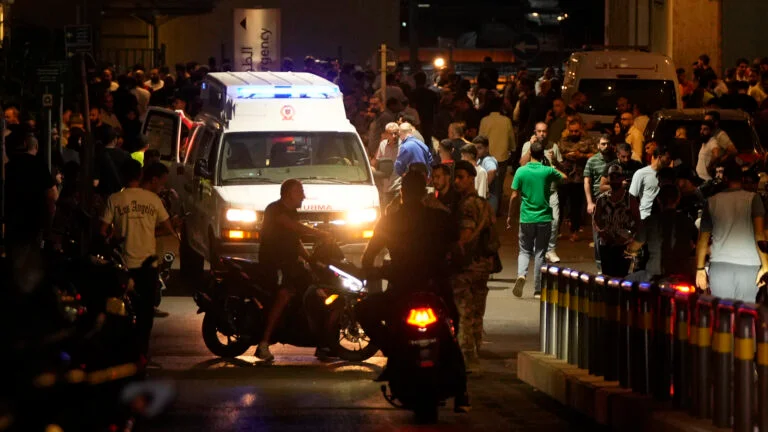International
Lebanese officials say Israel’s Mossad planted explosives in pagers as 9 killed, thousands injured

Israel’s Mossad spy agency planted explosives inside 5,000 pagers imported by Lebanese group Hezbollah months before Tuesday’s detonations, a senior Lebanese security source and another source told Reuters.
The operation represented an extraordinary security breach for Hezbollah, involving the detonation of thousands of pagers across Lebanon. The explosions resulted in nine deaths and nearly 3,000 injuries, including Hezbollah members and the Iranian envoy to Beirut.
According to a Lebanese security source, the pagers originated from Taiwan-based Gold Apollo, though the company denied producing the devices. Gold Apollo claimed the devices were made by another company, BAC, which was licensed to use its brand, but offered no additional details.

Hezbollah, which is supported by Iran, has pledged retaliation against Israel. While Israel’s military did not comment on the explosions, Hezbollah released a statement emphasizing its ongoing operations to support Gaza and promising severe repercussions for Israel in response to what they referred to as a massacre.
The plan for the operation appeared to have been in development for several months, according to sources. The senior Lebanese security source said Hezbollah had ordered 5,000 pagers from Gold Apollo, and multiple sources confirmed their arrival in the country earlier in the year.
Gold Apollo’s founder, Hsu Ching-Kuang, clarified that the pagers used in the incident were manufactured by a European company with the right to use his brand. He identified BAC as the manufacturer, though he couldn’t confirm further details about its location.
“The product wasn’t ours, it just had our brand on it,” Hsu told reporters from his office in New Taipei.
The senior Lebanese security source recognized the model of the pager, AP924, which could receive text messages but couldn’t make calls. Gold Apollo’s statement indicated the AR-924 model was produced and sold by BAC. The company stated that it only authorized the brand’s trademark use and was not involved in the product’s design or manufacturing.
Hezbollah fighters had been using these pagers to avoid Israeli tracking, according to two sources familiar with their operations. However, the senior Lebanese source revealed that Israel’s Mossad had modified the pagers during production. A small explosive device was hidden within the pager, capable of being activated remotely through an undetectable code.
When a coded message was sent, 3,000 pagers exploded simultaneously. Another security source confirmed that small amounts of explosives had been implanted inside the pagers, unnoticed by Hezbollah for months.
Hsu said he was unaware of how the pagers were rigged to explode. Israel did not respond to Reuters’ requests for comment. Images analyzed by Reuters of the destroyed pagers matched Gold Apollo’s products.
The attack dealt a heavy blow to Hezbollah, injuring and killing numerous fighters. One Hezbollah official, speaking anonymously, called it the group’s largest security breach since the outbreak of the Gaza conflict with Israel on October 7.
“This is the biggest intelligence failure Hezbollah has faced in decades,” remarked Jonathan Panikoff, a former U.S. government intelligence official.
In February, Hezbollah implemented a new war strategy to address vulnerabilities in its intelligence system. Prior to the pager explosions, Israeli strikes had already killed 170 Hezbollah members, including key leaders. In a televised speech, Hezbollah’s leader Hassan Nasrallah warned supporters about the risks posed by their phones, encouraging them to break or secure them, and switched to distributing pagers to members instead.
The aftermath of the explosions, as seen in hospital footage reviewed by Reuters, showed injured Hezbollah members with severe wounds.
The blast occurred during heightened tensions between Hezbollah and Israel, which had been engaged in cross-border hostilities since the conflict in Gaza erupted in October. While Hezbollah insists it does not seek an expanded conflict, it stands ready to engage if Israel escalates.
Israeli Defense Minister Yoav Gallant recently told U.S. Defense Secretary Lloyd Austin that time was running out for a diplomatic solution to the standoff with Hezbollah.
Experts, however, do not view the pager explosions as a signal of an impending Israeli ground offensive but rather as evidence of Israel’s significant infiltration of Hezbollah’s operations.
“This shows Israel’s capability to infiltrate its adversaries in a highly effective way,” said Paul Pillar, a former U.S. intelligence officer.







